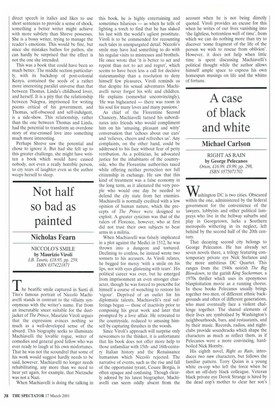Not half so bad as painted
Nicholas Fearn
NICCOLO'S SMILE by Maurizio Viroli
I.B. Tauris, £18.95, pp. 259, ISBN 0374221871
The beatific smile captured in Santi di Tito's famous portrait of Niccolo Machiavelli stands in contrast to the villainy synonymous with the writer's name. Far from an inscrutable sneer suitable for the dustjacket of The Prince, Maurizio Viroli argues that the expression evinces nothing so much as a well-developed sense of the absurd. This biography seeks to illuminate Machiavelli the lovable rogue, writer of comedies and general good fellow who was ever ready to laugh at his own misfortunes. That he was not the scoundrel that some of his work would suggest hardly needs to be said, however. Machiavelli no longer needs rehabilitating, any more than we need to hear yet again, for example, that Nietzsche was not a Nazi.
When Machiavelli is doing the talking in this book, he is highly entertaining and sometimes hilarious — as when he tells of lighting a torch to find that he has slaked his lust with the world's ugliest prostitute. Viroli is to be commended for recounting such tales in unexpurgated detail. Nice°lo's smile may have had something to do with his regular visits to mistresses and brothels. He once wrote that 'it is better to act and repent than not to act and regret', which seems to have been less a call for decisive statesmanship than a resolution to deny himself few pleasures. Viroli reminds us that despite his sexual adventures Machiavelli never forgot his wife and children. He explains (somewhat unconvincingly), 'He was bighearted — there was room in his soul for many loves and many passions.'
As chief of the Florentine Second Chancery, Machiavelli turned his subordinates into friends who would compliment him on his 'amusing, pleasant and witty' conversation that 'echoes about our ears' and 'relieves, cheers and refreshes us'. Any complaints, on the other hand, could be addressed to his face without fear of petty retribution. As a politician, he advocated justice for the inhabitants of the countryside, who the Florentine authorities taxed while offering neither protection nor full citizenship in exchange. He saw that this kind of treatment was a false economy in the long term, as it alienated the very people who would one day be needed to defend the city state from her enemies. Machiavelli is normally credited with a low opinion of human nature, which the precepts of The Prince were designed to exploit. A greater cynicism was that of the rulers of Florence, however, who at first did not trust their own subjects to bear arms in a militia.
When Machiavelli was falsely implicated in a plot against the Medici in 1512, he was thrown into a dungeon and tortured. Declining to confess, he instead wrote two sonnets to his accusers. As Viroli relates, he begged for mercy 'with a smile on his lips, not with eyes glistening with tears'. His political career was over, but he emerged from imprisonment an even stronger character, though he was forced to prescribe for himself a course of wenching to restore his 'vigour'. Deprived of an outlet for his diplomatic talents, Machiavelli's real sufferings began — those of inactivity prior to composing his great work and later that prompted by a love affair. He retreated to the countryside, reduced to amusing himself by capturing thrushes in the woods.
Since Viroli's approach will surprise only newcomers to the thinker, it is unfortunate that his book does not offer more help to those unfamiliar with 15thand 16th-century Italian history and the Renaissance humanism which NiccolO rejected. The narrative of events, such as the rise and fall of the opportunist tyrant, Cesare Borgia, is often opaque and confusing. Though clearly adored by his latest biographer, Machiavelli can seem oddly absent from the account when he is not being directly quoted. Viroli provides an excuse for this when he writes of our lives vanishing into 'the lightless, bottomless well of time', from which we can do nothing more than try to discover 'some fragment of the life of the person we wish to rescue from oblivion'. However, it does not help when little time is spent discussing Machiavelli's political thought while the author allows himself ample space to express his own homespun musings on life and the whims of fortune.


































































 Previous page
Previous page